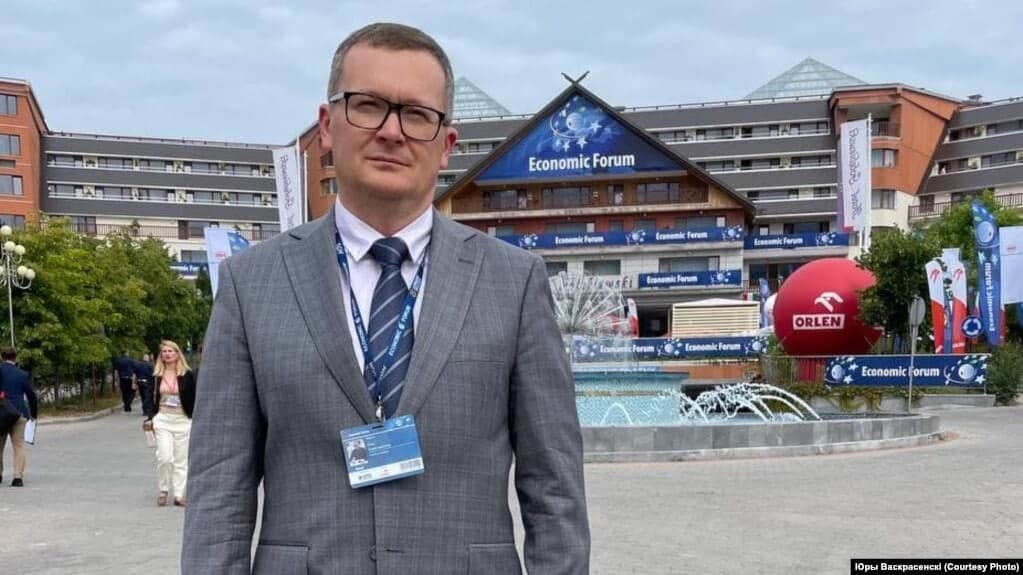A man believed to be an officer of the Belarusian KGB has attended Poland’s leading economic forum, setting off a storm of controversy, with organisers reportedly saying that his presence was a “mistake”.
The Economic Forum in Karpacz, often nicknamed the “Polish Davos”, kicked off yesterday, with senior government officials and business leaders in attendance. Also present this week are Sviatlana Tsikhanouskaya and Franak Viačorka, prominent figures in the Belarusian democratic opposition.
But in the midst of this, another attendee was identified by Tadeusz Giczan, a Belarusian opposition activist and former editor of the Nexta channel, as Yuri Voskresensky. Giczan described him as a “full-time employee of the Belarusian KGB” who “forces political prisoners to confess”.
Organizatorzy mówią, że to przez pomyłkę, zaś sam Woskriesienskij napisał przed chwilą, że "polscy politycy są zmęczeni konfrontacją i chcą odbudowywać mosty [z reżimem Łukaszenki]" i to dlatego go zaproszono: https://t.co/SGyjaPRLGW
— Tadeusz Giczan (@TadeuszGiczan) September 7, 2021
Voskresensky is a former oppositionist and political prisoner who began working with Belarusian president Alexander Lukashenko’s regime last year.
In recent months he has been involved in negotiating with detained Polish minority leaders in Belarus to encourage them to “plead guilty” and “ask for pardon” in exchange for their freedom.
In his tweets, Giczan wrote that the organisers of the forum said they had invited the Belarusian official “by mistake”. Voskresensky himself, however, claimed that he was “invited by representatives of the Polish establishment who are tired of the Belarusian opposition and want a reset with Lukashenko to solve the migration crisis”.
Recent weeks have seen an unprecedented number of illegal crossings into Poland over the border from Belarus, with Warsaw accusing Minsk of deliberately orchestrating the situation.
Dziennikarzowi Biełsatu udało się złapać Woskriesienskiego. Ten twierdzi, że został zaproszony przez przedstawicieli polskiego establishmentu, którzy są zmęczeni białoruską opozycją i chcą resetu z Łukaszenką by w ten sposób rozwiązać kryzys migracyjny. pic.twitter.com/o7TEi2FTut
— Tadeusz Giczan (@TadeuszGiczan) September 7, 2021
A spokesman for the forum told TVN24 that anyone can register to attend the event and the organisers do not select participants. He noted that Tsikhanouskaya was there to represent “democratic Belarus”.
However, Voskresensky’s attendance drew criticism from political and diplomatic figures. Jerzy Marek Nowakowski, a former Polish ambassador to Latvia and Armenia, called it a “scandal”. He claimed that the former Belarusian opposition activist was on an old list of guests, who were reinvited this year, reports TVN24.
Michał Szczerba, an opposition MP, tweeted that inviting a “full-time functionary of the Belarusian KGB” to a “party with…half of the government” was “a spit in the face of seven hundred political prisoners” in Belarus.
Writing for Onet, Witold Jurasz, head of the Centre for Strategic Analysis (OAS), claimed that two sources at Poland’s foreign ministry confirmed that Voskresensky’s presence was, in fact, not a mistake. They said that the Belarusian was there to hold informal talks over releasing two prominent ethnic Polish leaders imprisoned by Minsk.
During a rare press conference last month, Lukashenko said that his country needed to find a “common language” with Poland. He claimed that unofficial talks had already been taking place. The comments were not confirmed by the Polish side.
Asked about Voskresensky’s attendance at the forum, the spokesman for Poland’s security services, Stanisław Żaryn, told Polsat News that he had “nothing to say”.
Warsaw has recently accused Minsk of conducting a “hybrid war” against Poland and other EU states by facilitating the passage of migrants across the border.
Since last year’s disputed presidential elections, at which Lukashenko claimed victory amid widespread evidence of fraud, Poland’s government has been a vocal support of the Belarusian opposition.
Warsaw has led calls for the European Union to take firmer action against Minsk and Prime Minister Mateusz Morawiecki has twice met with exiled opposition leader Tsikhanouskaya and given asylum to hundreds of Belarusians fleeing the regime.
Main image credit: Tadeusz Giczan/Twitter

Maria Wilczek is deputy editor of Notes from Poland. She is a regular writer for The Times, The Economist and Al Jazeera English, and has also featured in Foreign Policy, Politico Europe, The Spectator and Gazeta Wyborcza.



















